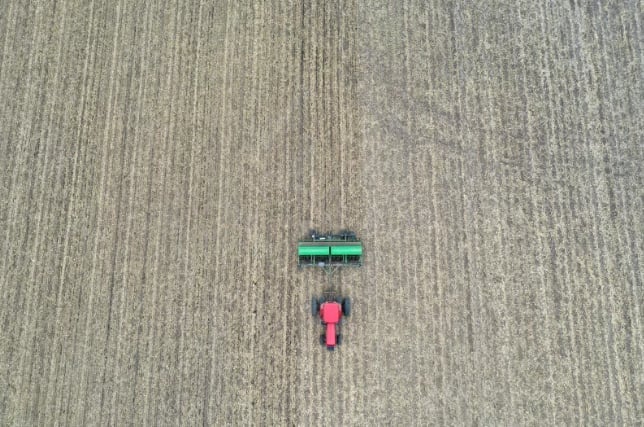November 25, 2025 | 13:36 GMT +7
November 25, 2025 | 13:36 GMT +7
Hotline: 0913.378.918
November 25, 2025 | 13:36 GMT +7
Hotline: 0913.378.918

Soybean planting near Dwight, Ill., in a file photo from April 23, 2020. Photo: Scott Olson/Getty Images.
"These tariffs are going to affect everything. It'll affect our parts — it's just across the board. Which is going to hurt everything," he said.
Not only do tariffs affect the cost of farm supplies, but they also raise the risk of retaliation against exports of U.S. crops: a double-whammy for farmers like Pihl.
"It's a good way to lose your customers," he said. "And I think we'll probably lose more on this round, too, because I know that Mexico is our biggest importer of corn. But this time, they may figure out that they can get corn from South America just as easily as from the U.S."
President Trump has imposed tariffs on countries from around the world, including 25% on steel and aluminum, 25% on some Canadian and Mexican goods, and a staggering 145% on Chinese goods. So far, the most notable retaliation has come from China, which has now imposed a 125% tariff on U.S. goods.
The White House is considering ways to help farmers. "We're already starting to think about what a mitigation effort might look like," Secretary Brooke Rollins said on Fox News this week.
She nodded to indicate that Trump's administration gave farmers money that came from a fund called the Commodity Credit Corporation (CCC) during his first-term trade dispute with China.
It's a fund that has been around since the Great Depression, explained Joseph Glauber, a former USDA chief economist. "This was really a new thing that the Trump administration did, is that they tapped the CCC certainly at a level that had not been seen before for extraordinary payments," Glauber said.
All told, the first Trump administration spent $28 billion bailing out farmers. This time around, the tariffs are much higher than they were six years ago, and it's unclear how long they will persist.
NPR asked the White House for details on what relief is under consideration this time, but received no response.
The payments were helpful, Pihl said. However, they weren't a fix for the longer-term damage done by Trump's first-term tariffs.
"That was just for the one year. What about the market loss that continued through his term and into Biden's term? I think the amount is incredible," he said.
Soybeans are where that damage is most visible. China has long been the largest market for U.S. soybean exports. However, during the trade dispute in Trump's first term, China ramped up its purchases of Brazilian soybeans, replacing U.S. soybeans. The U.S. market share has never recovered.
Trump expressed confidence this week that he will be able to reach a deal with China to end the escalating trade fight. For now, some in the farm sector are hopeful that Trump will make deals to help farmers.
"You know, he's a negotiator," said Kenneth Hartman, Jr., president of the corn board at the National Corn Growers Association. "He did a good job negotiating the U.S.-Mexico-Canada Agreement, USMCA, when he negotiated that during his first term. So we're hoping that he can do something like that," Hartman said.
There's another wrinkle to this all, which is timing. All of this tariff drama unfolds in the spring, when farmers make decisions about planting big export crops, like corn and soybeans.
American soybean farmers might decide to grow other crops, like corn, to avoid market risks in China. That could weigh on corn markets.
But also, an aid package announced too soon has the potential to distort markets, said Glauber, the former USDA economist.
"If you're too generous with one crop vis-à-vis another, you could have farmers making planting decisions based on what they think those compensation payments might be," Glauber said.
Farmers also say government aid is helpful, but it's not their first choice.
"Farmers want markets. We need markets. We want to sell our grain at a profit," said Hartman, adding that CCC payments are only a short-term fix.
"It's supplemental, it's needed because it keeps farmers from getting in a worse financial situation, but payments are not the answer to a future successful agriculture operation in the United States," Hartman said.
John Pihl feels similarly about the subsidies. "I don't want it, but I'll take it. I'd be an idiot not to take it. That's about all I can say."
NPR

(VAN) Brazil's COP30 presidency pushed through a compromise climate deal on Saturday that would boost finance for poor nations coping with global warming but that omitted any mention of the fossil fuels driving it.

(VAN) Poultry farmers in the UK have been warned that they could face one of the worst winters yet for bird flu.

(VAN) Prices of main-crop paddy have risen sharply, with jasmine rice hitting 16,100 baht per tonne — the highest level in years.

(VAN) In Brazil, FAO unveiled a series of reports and initiatives showing how sustainable agrifood systems are a solution to the climate crisis.

(VAN) With names like neodymium and dysprosium, rare-earth elements sound exotic — and their perceived scarcity has only added to the mystique.

(VAN) In a new study published in Trends in Biotechnology, researchers used a gene-editing technology called CRISPR to increase a fungus's production efficiency and cut its production-related environmental impact by as much as 61%- all without adding any foreign DNA.

(VAN) A top official in Beijing’s Cop delegation says China is committed to clean energy – but US’s absence is a problem.